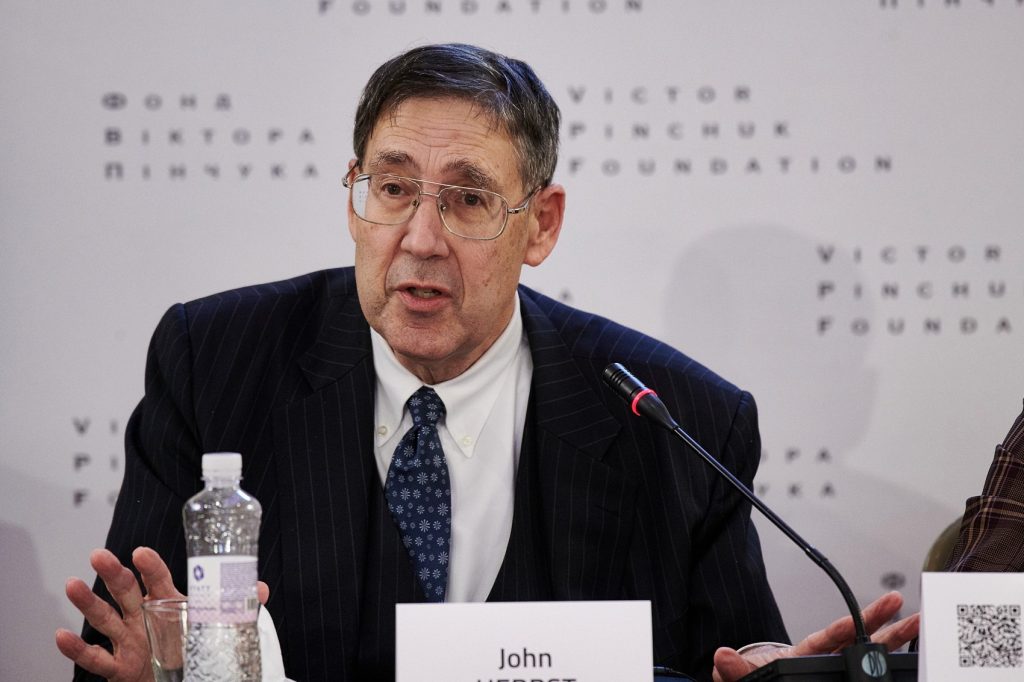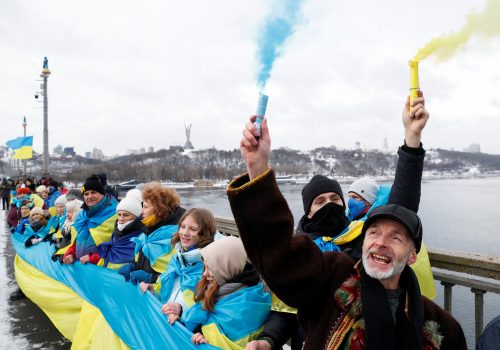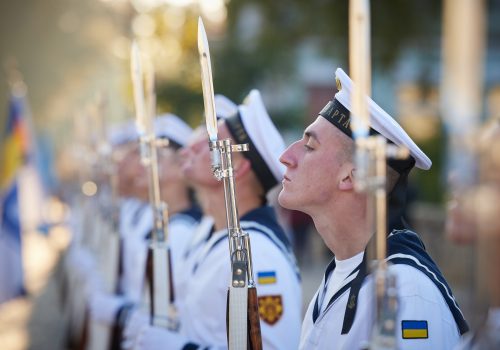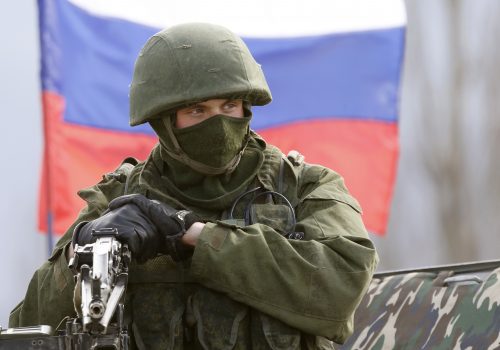The Atlantic Council’s Eurasia Center organized a delegation to visit Kyiv on January 30-February 1 planned around a major public event organized in concert with Yalta European Strategy and the Victor Pinchuk Foundation, a partner of the Eurasia Center.
The delegation consisted of General (Ret.) Philip M. Breedlove; Atlantic Council Eurasia Center Deputy Director Melinda Haring; Atlantic Council Eurasia Center Senior Director Ambassador (Ret.) John Herbst; LTG (Ret.) Ben Hodges; Ambassador (Ret.) Steven Pifer; USIP Vice President Ambassador (Ret.) William Taylor; Ambassador (Ret.) Alexander Vershbow; and Ambassador (Ret.) Marie Yovanovitch.
The purpose of the trip was to deliver a message from distinguished former officials and current experts that the United States stands firmly behind Ukraine in the face of a threatened major new Kremlin military offensive.
The delegation believes that Ukraine’s fight deserves extensive US, NATO and EU support, because Ukraine’s development as an independent, stable and democratic state will contribute to a more stable and secure Europe and because Moscow’s aggressive designs will not be satisfied by imposing its will on Ukraine.
If Putin and the Kremlin win in Ukraine, they may threaten the Baltic states, Poland, or other US allies next. Further, if the United States with all of its European allies and partners working together fails to deter Putin in Ukraine, then China will likely be emboldened in the Indo-Pacific region.
Stay updated
As the world watches the Russian invasion of Ukraine unfold, UkraineAlert delivers the best Atlantic Council expert insight and analysis on Ukraine twice a week directly to your inbox.
The public event on January 31 was attended by more than 100 senior Ukrainians, all major Ukrainian media, and many major Western media. This event enabled the delegation to spread their message of support throughout Ukraine and to an international audience.
While in Kyiv, members of the delegation were honored to meet with President Zelenskyy, accompanied by Presidential Chief of Staff Andriy Yermak and Foreign Minister Dmytro Kuleba.
Delegation members also met with Rada Speaker Ruslan Stefanchuk and Rada Foreign Relations Committee Chairman Oleksandr Merezhko; former Rada Speaker Dmytro Razumkov; Naftogaz CEO Yuriy Vitrenko and advisor Svitlana Zalishchuk; Fatherland political party chair and MP Yuliya Tymoshenko and advisor Hryhoriy Nemirya; Deputy Defense Minister Oleksandr Polishchuk; Servant of the People faction leader Olena Shuliak; Kira Rudik, MP and chair of the Holos political party and Andrii Osadchuk, MP and Holos leader; as well as US Chargé d’affaires a.i. Kristina Kvien.
The visit could not have come at a more opportune time. The delegation was struck by Ukrainians’ steadfastness and calm in the face of the looming Russian military threat. Many Ukrainian interlocutors stated that Ukraine has been facing down Kremlin aggression for eight years, and they underscored that the Ukrainian armed forces were much better trained and equipped than in 2014. The determination of the Ukrainian people to fight for their sovereignty was underscored by a new poll showing that 45% of the population were prepared to engage in armed resistance against a Russian invasion.
Eurasia Center events

The delegation offers the following recommendations at this difficult juncture:
1. President Zelenskyy and the country’s principal political parties should unite in putting aside current political disputes and focus on the outside menace. Ukraine’s opposition parties should understand that this can only occur under presidential leadership. The president should convene a meeting of leading political figures to demonstrate unity and leadership in the face of the Russian threat.
2. The Ukrainian government should build on the legislation passed for territorial defense units and its own first efforts to harden regional defenses, with the aim of preparing and equipping the local population to resist an invading Russian army.
3. The US government should strengthen its own good efforts to deter further Kremlin aggression. The White House has accelerated shipments of military aid as part of its broader effort to deter a Kremlin offensive; however, Ukraine remains incapable of maintaining sovereign control of its airspace and sea-space in the face of dedicated Russian attack. Efforts should be made to increase their immediate capability to the degree possible. In order to send a clear message of continuing US support, the US government should begin the longer-term training and equipping of Ukraine’s air and maritime forces in order to enable them to defend their sovereign spaces in the future. Specifically, in the short term, the US should begin supplying newer generation Stingers to Ukraine.
4. The US has announced that 2,000 troops would be deployed soon from the United States to Poland and Germany and that 1,000 US troops in Germany will redeploy to Romania on a bilateral basis. The US has also placed 8,500 troops in the United States on alert that could deploy as part of and in support of the NATO Response Force if it deploys to NATO’s eastern flank. These steps should be expedited to reassure allies and signal to the Kremlin NATO’s firm determination to defend alliance members. The US should also accelerate the sale of M1 Abrams tanks to Poland.
5. The US should publicly announce the financial sector elements of the planned US sanctions package to leave Moscow in no doubt that, if a new invasion occurs, Russia will pay a heavy price.
6. The US and the EU should work with the IMF on a major package of assistance to help Kyiv manage the economic problems caused by Moscow’s ongoing intimidation campaign, and especially the pressure on Ukraine’s currency. The US and the EU should work with international relief organizations to plan the major humanitarian assistance that would be required if the Russian military launches a new assault on Ukraine.
Some NATO allies have distinguished themselves in the current crisis. The Baltic states, Canada, Poland, Romania and the UK have provided arms to Ukraine. France has decided to send troops to Romania. The UK plans to bolster its force presence in the Baltic region. These countries should consider providing more sophisticated equipment as well.
The delegation also stipulates that it is past time for Berlin to state unequivocally that the Nord Stream 2 pipeline project will be ended if the Russian military again attacks Ukraine.
In conclusion, the delegation strongly supports Ukraine’s independence, sovereignty, territorial integrity, and right to determine its own foreign policy course and urges all Western friends of Ukraine to step up their actions now in an effort to deter and dissuade the Kremlin from a military attack that would plunge West-Russia relations into even deeper crisis and prove a tragedy for Ukraine and for Russia as well.
Further reading
The views expressed in UkraineAlert are solely those of the authors and do not necessarily reflect the views of the Atlantic Council, its staff, or its supporters.

The Eurasia Center’s mission is to enhance transatlantic cooperation in promoting stability, democratic values and prosperity in Eurasia, from Eastern Europe and Turkey in the West to the Caucasus, Russia and Central Asia in the East.
Follow us on social media
and support our work
Image: Atlantic Council Eurasia Center Senior Director Ambassador (Ret.) John Herbst pictured in Kyiv




